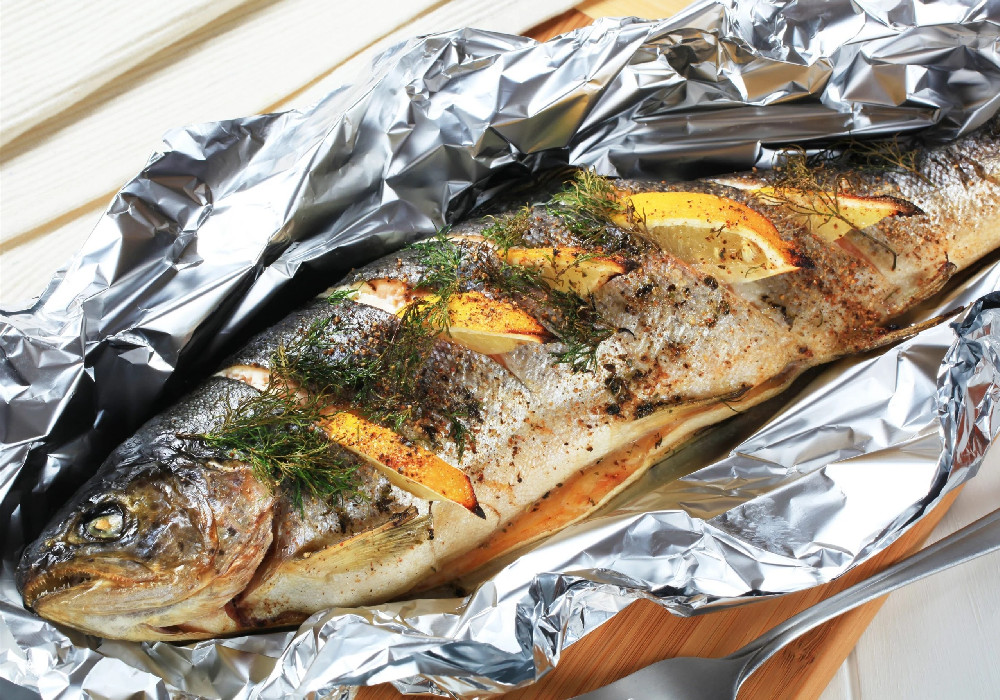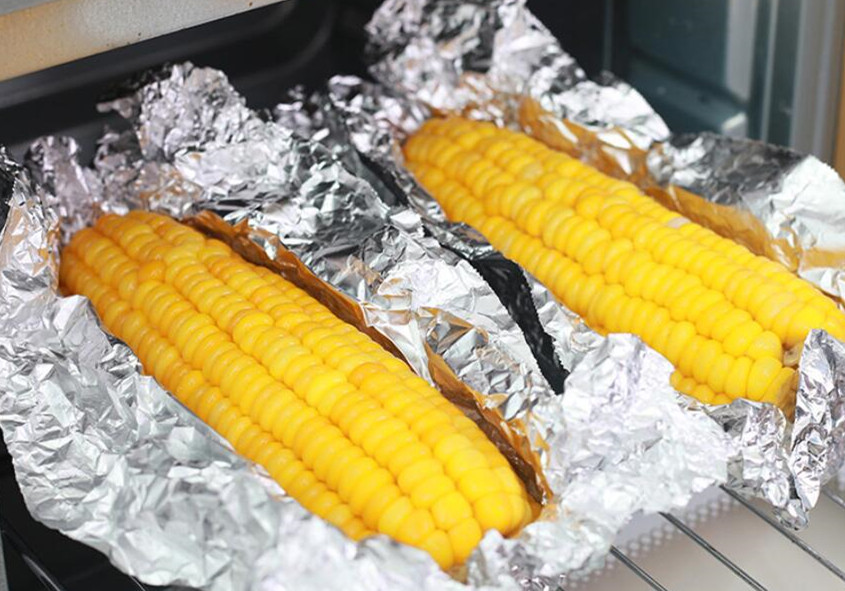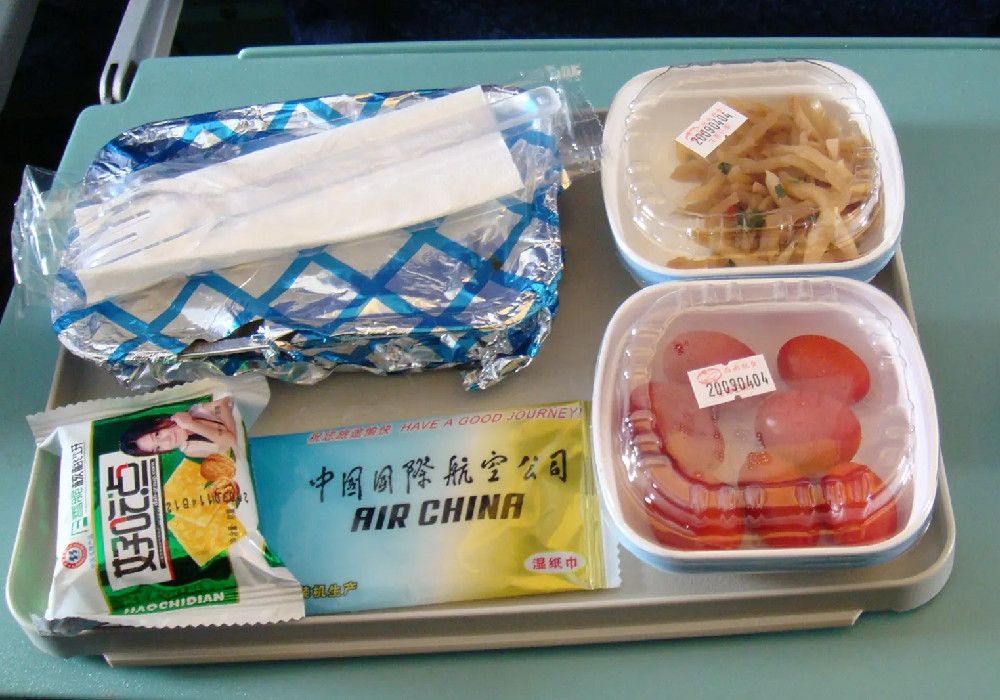Food packaging foil
Because of its good formability, high barrier, aluminum foil can isolate air, and does not absorb moisture or grease, so it can maintain food freshness and prolong the shelf life. At the same time, food packaging foil can withstand temperatures from -40°C to 600°C, users can bake, freeze, transport and supply a series of processes in a simple, safe and convenient aluminum foil packaging, so it is widely used in household and commercial food packaging.
Main categories of food packing foil
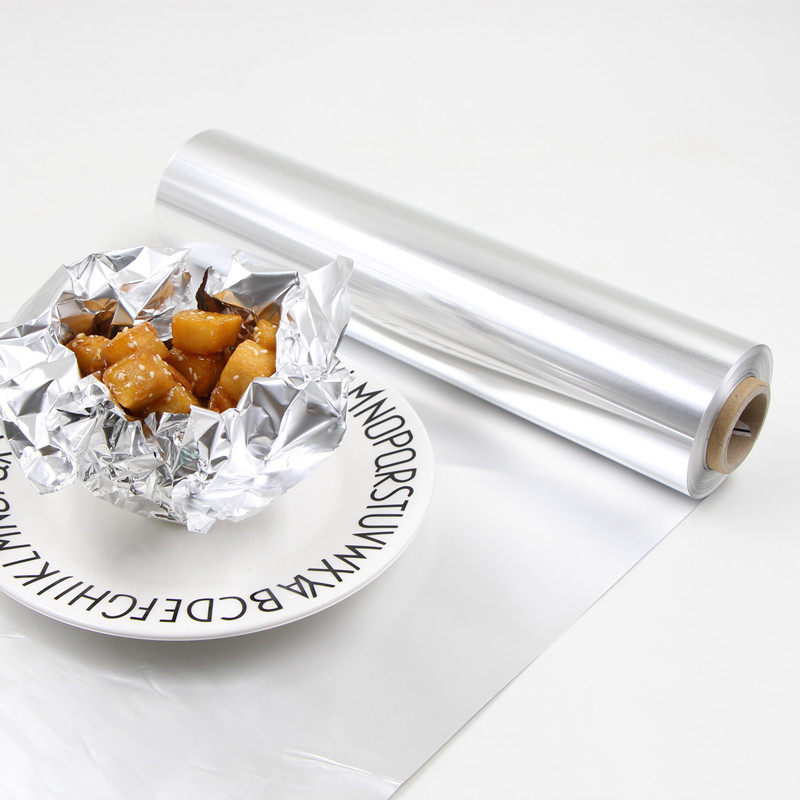
Food packaging foil roll
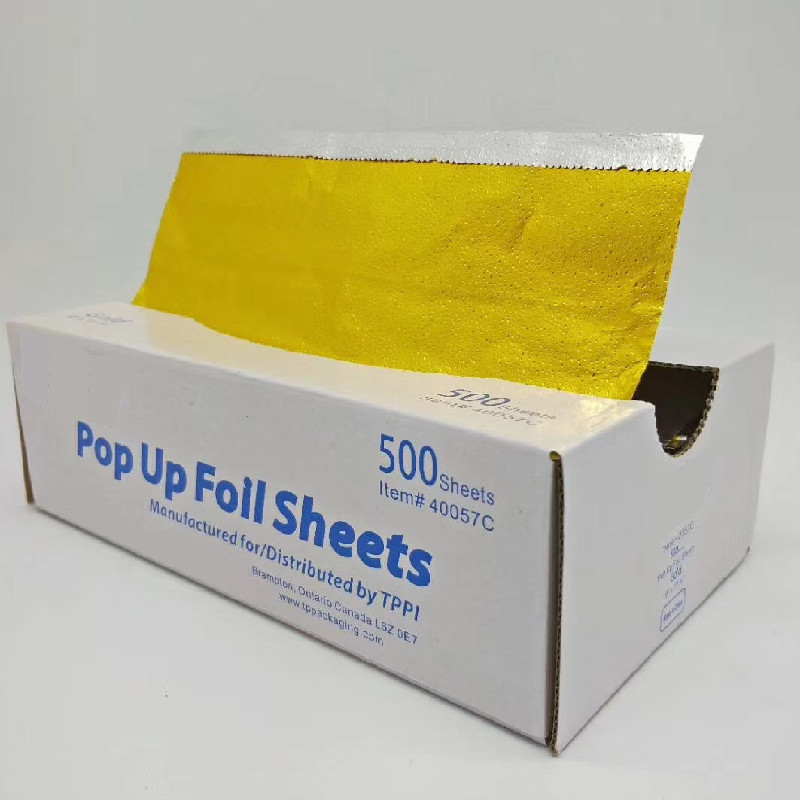
Pop-up foil sheet
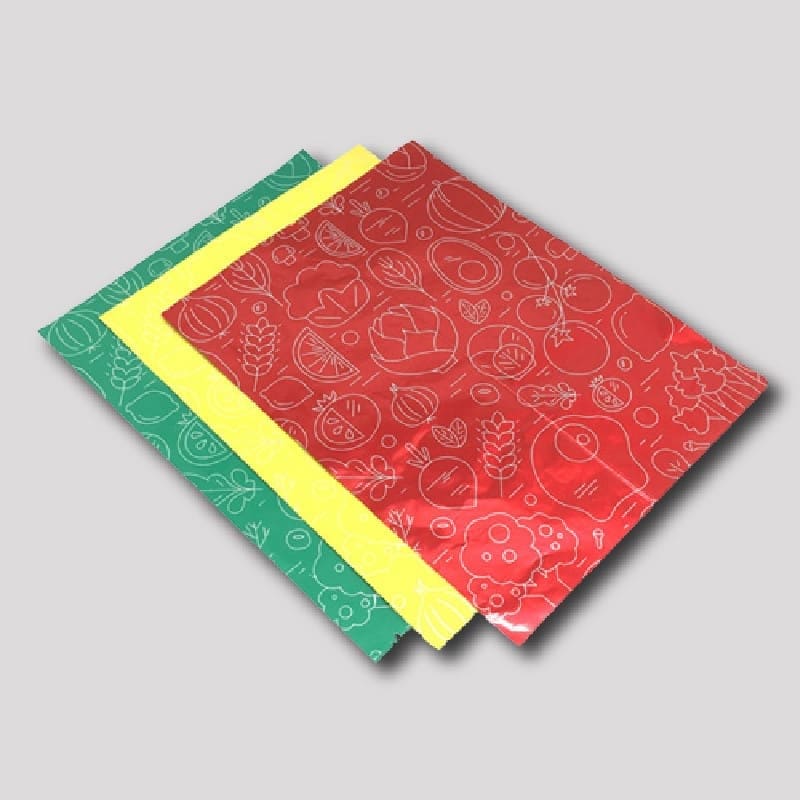
Pre-cut foil sheet
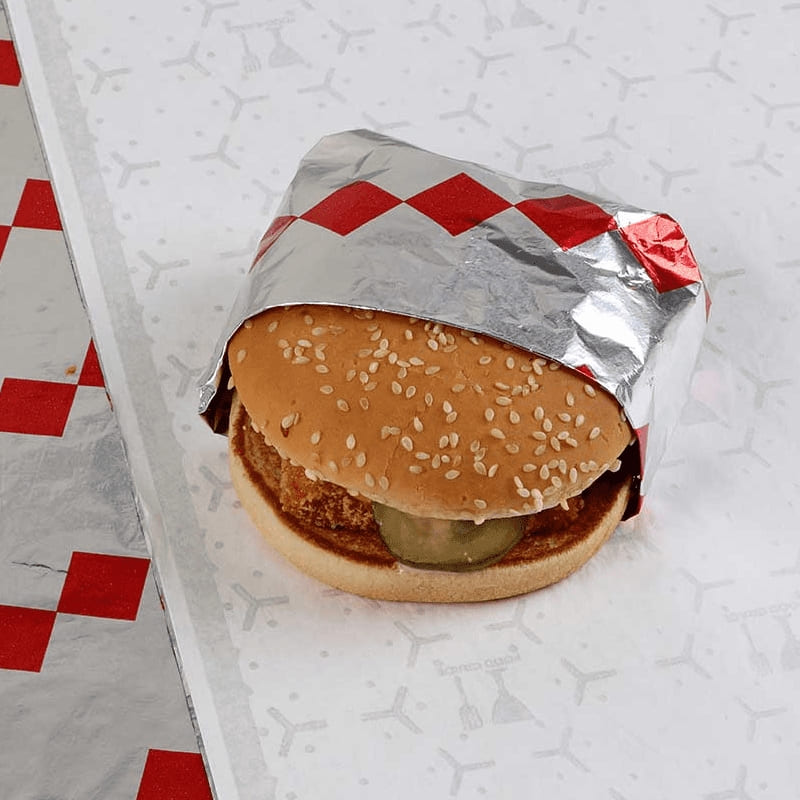
Hamburger foil
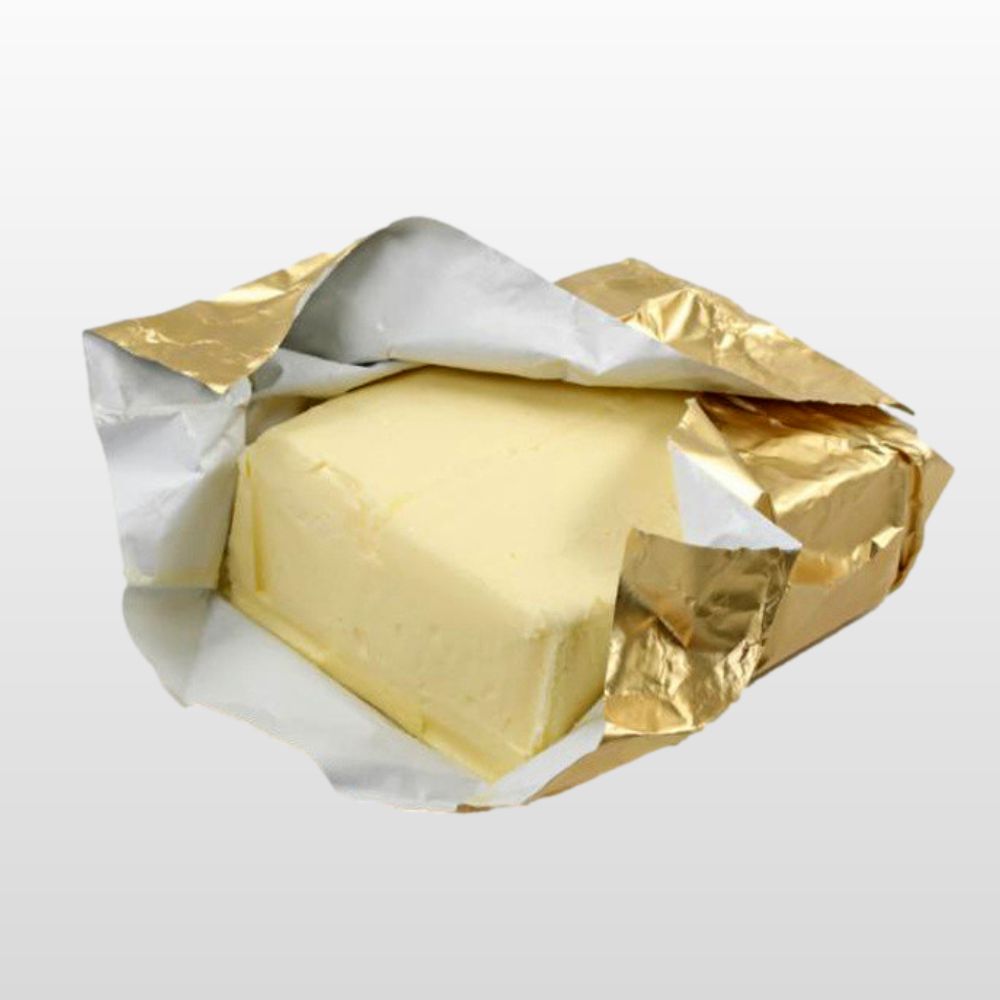
Butter foil
Food packaging foil roll
Food packaging foil roll is the most common type for household foil and catering foil, they can be cut to any length you want.
- Thickness : 0.012 to 0.025mm
- Width : 20cm, 30cm, 45cm, and 60cm, or customized
- Length : 10m to 300m
- Printing : Single color printing, multi-color printing, pattern printing, up to 6 colors
- Embossing : Plain or with embossing
- Packaging : 1 roll/box, with/without blade. Rolls set, several rolls/box.
Pop up foil sheet
Pop-up foil sheet is a new product popular in the food industry in recent years. It adopts the structure of interlocking folding and packed in pop-up box, which can be operated with one hand to complete the process of food packaging quickly.
- Thickness : 0.012 to 0.025mm
- Width : 120mm to 420mm
- Length : 273mm in standard and others customized from 230mm to 450mm
- Printing : Single color printing, multi-color printing, pattern printing, up to 6 colors
- Embossing : Plain or with embossing
- Packaging : 50 to 500pcs/ pop-up box.
Pre cut foil sheet
Pre-cut aluminum foil sheet, can be customized according to customer needs in any size. A variety of different embossing patterns for choice, not only improve the aesthetic degree, after embossing friction increases, easier to take.
- Thickness : 0.012 to 0.025mm
- Width : 120 to 420mm
- Length : 220m to 500m
- Printing : Single color printing, multi-color printing, pattern printing, up to 6 colors
- Embossing : Plain or with embossing
- Packaging : 20, 50, 200, 500pcs/pack, customized
Hamburger foil
Hamburger foil is aluminum foil paste with food grade paper, can print a variety of patterns, then cut into certain sizes on request, mainly used to pack fast food that are ready to eat, such as hamburgers, sandwiches, hot dogs and so on.
- Thickness : 0.006 to 0.011mm Alu/food grade paper 22 to 30gsm
- Width : 250mm to 500mm
- Length : 250 to 700mm
- Printing : 0 to 6 colors
- Embossing : Pure foil plain or with embossing, paper laminated foil without embossing
- Packaging : 200 to 1000pcs/bag, also can packed with pop-up box
Butter foil
Using food grade greaseproof paper and aluminum foil composite, surface printing and embossing processing, suitable for butter, ice cream and other food packaging. Rolling is suitable for high-speed automatic packing machine, slicing is suitable for manual or semi-automatic packing machine.
- Thickness : 0.006 to 0.009mm Alu/food grade paper 40/60gsm/PE
- Width : 90 to 600mm
- Length : 500m to 1500m for roll, and customized for sheet
- Printing : Single color printing, multi-color printing, pattern printing, up to 9 colors
- Embossing : Plain or with embossing
- Packaging : 1 roll/carton for roll, 200 to 10000pcs/carton for sheet, packaging customzied
What you care about food packaging foil?
Applications
Characteristics of alumnium foil
Food packaging foil is widely used in household and commercial food processing and packaging due to the following characteristics.
- Non-toxic, can come into direct contact with food.
- Inorganic, not easy to breed bacteria,
- Withstand a wide range of temperature difference, in minus 20 ℃ to 200 ℃ can be used
- Soft, easy to fold and form, convenient to wrap food
- Excellent barrier,
- Good thermal conductivity
- Eco friendly and recyclable
In addition, food packaging foil can be printed, embossed, can be combined with paper, plastic film and other superior mechanical properties, the commercial value of aluminum is increasing, make it more and more widely used in food packaging, especially fast food and takeaway industry.
Applications
- Use as lining paper when baking
- Wrap food when cooking, heat transfer quickly and evenly to avoid burning food
- At picnics, it can be used to wrap food such as corn, potatoes, meat, sausage, etc., to ensure the food is tender and juicy.
- Use as a lid, put the aluminum foil sheet directly covered on the container, then folded along the edge of the container by hand, then the container sealed, which can effectively prevent liquid splashing out. It is mainly used for airline catering, Karaoke, and casino drinks services.
- Wrap burgers, burritos, fried chicken and other snacks, especially for takeout food, to keep the food fresh and tender.
Safety
Is Cooking with Aluminum Foil Bad for You?

Christine Byrne, M.P.H., RD
Just when you think you’ve gotten the hang of healthy eating and balanced nutrition, the internet comes up with something else you may or may not need to worry about. One question that seems to be on people’s minds lately is whether or not it’s safe to cook with aluminum foil. The short answer is that using aluminum foil in the kitchen is safe, but let’s take a deeper look into why this is-and why anyone would worry in the first place.
Aluminum is everywhere, and that’s not a problem.
First, it’s important to know that aluminum isn’t just found in foil. “Aluminum is found in lots of different things,” says Shelly Wegman, M.S., RD, a registered dietitian with UNC REX Nutrition Services in Raleigh, North Carolina. “It’s naturally found in water, air and soil, and it’s used in additives and preservatives, plus in things like antacids and buffered aspirin.” Most plant foods contain trace amounts of aluminum because of the soil they are grown in. Animal foods contain trace amounts of aluminum because, well, animals eat plants. And yes, small amounts of aluminum do leach into food that’s cooked using aluminum foil or aluminum cookware, or that’s packaged in aluminum cans.
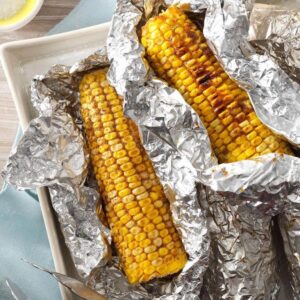
It’s incredibly unlikely that you’ll consume toxic amounts of aluminum just by cooking with foil.
“An average healthy person is at very minimal risk for aluminum toxicity, if any,” Wegman says. According to the Centers for Disease Control (CDC), “Most aluminum in food, water and medicines leaves your body quickly in the feces,” while “much of the small amount of aluminum that does enter the bloodstream will quickly leave your body in the urine.”
There’s been some debate over whether or not aluminum foil might contribute to the development of Alzheimer’s disease, but according to the Alzheimer’s Association, current research doesn’t show that aluminum foil poses any threat.
High temperatures and acidic foods can cause slightly more aluminum to leach into food.
While there really is no threat of consuming toxic levels of aluminum under ordinary circumstances, there are certain things you can do to minimize the amount of aluminum that leaches into your food from foil. “The recommendation is to avoid cooking things in or on aluminum foil at really high temperatures (400°F or above), and to avoid wrapping acidic foods in aluminum foil for long periods of time,” Wegman says.
Again, it’s highly unlikely that using aluminum foil at high temperatures or with acidic foods will cause any harm. But if you’re worried, you can use parchment paper instead of using aluminum foil for high-temperature cooking, and store acidic leftovers (anything that contains lots of citrus, vinegar or tomato) in glass containers instead of wrapped in foil.
Bottom line: There’s no need to worry about aluminum foil.
“I have never seen or heard of a case of aluminum toxicity,” Wegman says. Your body does a fine job of getting rid of any aluminum you eat, drink or breathe in.
Want to know more?
Send us a message if you have any questions or request a quote. I will reply within 24 hours.
- +86 18906431372(WhatsApp/Wechat)
- [email protected]
If you do not mind, please do leave your phone number, because it is easier to get in touch with you.
If you do not receive my reply in time, please check the spam box, because sometimes my reply is there.
If your needs is urgent, please contact me directly on WeChat or Whatsapp.





